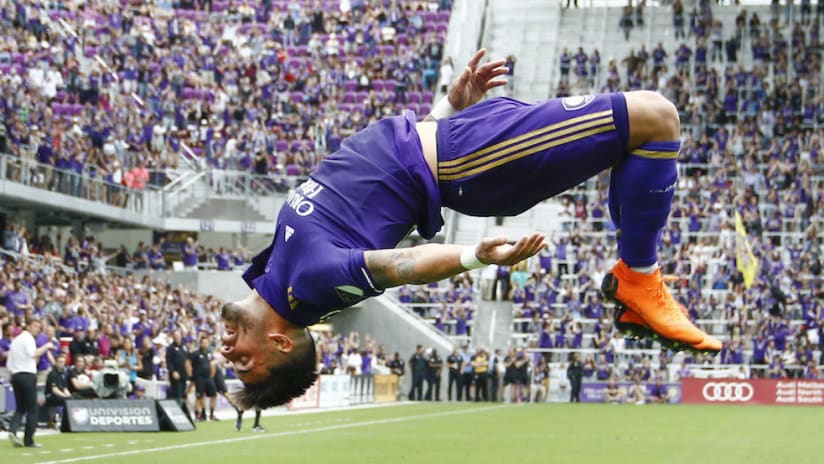It may seem like just a distant memory now, but up until just a few years ago, MLS had a geography problem.
The league’s original footprint was blemished by a yawning gap in the Southeast, a blank spot on the map with nary a team in the huge swath of territory between Texas, South Florida and Washington, D.C.
That gap left many millions of people, several thriving soccer hotbeds and some of the fastest-growing metropolitan areas in the United States out of the MLS loop. For a league hungry to grow in terms of relevance as well as size and quality, it was a nagging shortcoming that had to be addressed eventually.
“We need to be in the Southeast. We certainly need a team south of Washington, D.C.,” Commissioner Don Garber told ESPN back in 2011. “The question isn't if, it's when.”
Garber & Co. already had Atlanta, and a return to Florida, on their radar at that point, and today we can all see exactly why. And that long-running quest of yore might flash through the minds of a few old-timers like myself when Atlanta United visit Orlando City in the second game of a tasty national-television triple bill on Sunday (6 pm ET | FS1 - Full TV & streaming info), sandwiched between the famous Portland-Seattle Cascadia clash and a big-market matchup between LAFC and New York City FC.
The Five Stripes and Lions are two of the hottest teams in the league right now, occupy first and third place in the Eastern Conference standings, respectively, and boast scads of attacking firepower between them. But there’s also a beguiling cultural component to this, and a meeting of contrasts. This is "Dirty South vs. "Florida Man" (and Woman).
One team plays in a hulking, air-conditioned, retractable-roof behemoth, the other in an intimate, noisy ground where the tropical sun beats down. One carries a pronounced Argentinean tinge, the other speaks with a Brazilian accent. Both have rapidly crafted sturdy identities and are cheered on by large ranks of adoring fans known to impress and aggravate their MLS counterparts in equal measure.
Look, I fully recognize that people in and around MLS can get quite overeager about the concept of “rivalries,” a powerful concept in sports but one that tends to be resistant to inorganic creation or promotion. I’m in no hurry to crown Atlanta-Orlando as anything epochal just yet, or even name it, for that matter.
I noted with approval when Five Stripes head coach Tata Martino, who has stood in the eye of the storm in some of world soccer’s oldest and most insane derbies, put a healthy damper on the hype after the first of 2017’s three Orlando-Atlanta meetings.
“I think we’ll have to wait another 50 years to find out,” he said last July. “We need another 50 years and 100 games between the two teams before we can call it a rivalry.
“I appreciate the enthusiasm you guys have about it, but it’s far from being a rivalry.”
Tata is right, of course. But like a Spring Breaker heading south to the Sunshine State or into downtown ATL for Freaknik (RIP), not all of us want to wait 50 years to have some fun.
ATLUTD poked a prominent metaphorical finger into Orlando City’s chest last year when they planted a boastful billboard in downtown Orlando, then hit town and dramatically won the clubs’ first-ever meeting 1-0.
The Lions (whose fans welcomed the Five Stripes to town with a menacing "Walking Dead"-inspired tifo) struck back with two well-earned road draws in Atlanta, the second of which was a wild 3-3 barnburner that remains one of the few occasions on which United have failed to take all three points from a match at Mercedes-Benz Stadium:
The Five Stripes got the last laugh in 2017 by qualifying for the MLS Cup Playoffs, however, a milestone the purple ones have yet to reach in three MLS campaigns. All that probably adds up to the onus being on the home side at Orlando City Stadium on Sunday.
“Last year, we played them three times,” Lions goalkeeper Joe Bendiksaid of Atlanta after the weekend win over Real Salt Lake. “All three of them felt like playoff games. [Sunday] is going to be an awesome opportunity for us.”
From their ambition to their spending to their centrality in their communities, Atlanta and Orlando have been a breath of fresh air on many levels since joining MLS. They’ve helped the beautiful game plant powerful flags in “SEC Country,” a region once considered durably hostile to pro soccer. And on Sunday, I expect them to serve up some fireworks, whether we apply “the R word” or not.













